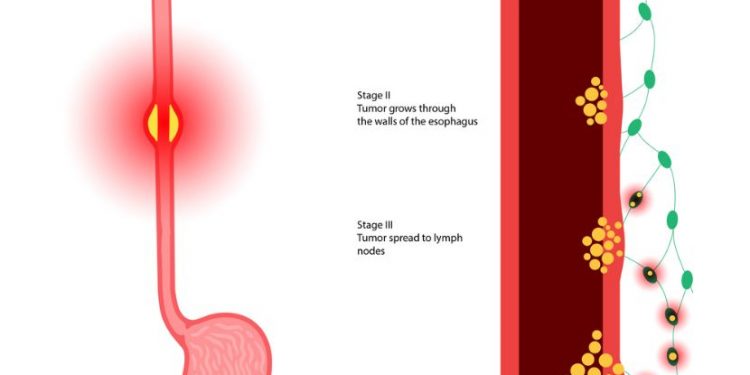The esophagus is the long, tube-shaped muscle that carries food from your throat to your stomach. Cancer that starts in the inner lining of the esophagus, called the mucosa, can spread to other layers of the esophagus or to nearby lymph nodes or to other parts of the body (metastasize). Cancer cells grow and divide without control or order. They can also develop mutations that cause them to grow or behave abnormally.
The two most common types of esophageal cancer are squamous cell carcinoma and adenocarcinoma. Squamous cell carcinomas start in flat cells that line the upper and middle parts of your esophagus. They usually occur nearer to the throat than adenocarcinomas. Adenocarcinomas develop from cells that line the lower part of your esophagus. These cells can mutate and become more like the cells that line the intestines. This type of esophageal cancer is more likely to be caused by a history of gastrointestinal reflux disease and is often associated with smoking.
Adenocarcinomas tend to be more serious than squamous cell carcinomas. They are more likely to be diagnosed in the later stages of the disease, when they have already spread to other parts of the body. They are also more difficult to treat.
Doctors use a number of tests to diagnose esophageal cancer. They can check for signs of the disease in the esophagus, such as pain when swallowing or difficulty breathing. They can also find out if cancer has spread to other parts of the body by looking at the biopsy results or doing a chest x-ray and CT scan.

When esophageal cancer is found, doctors use the information from the test results and other information to stage the tumor. They also use the tumor’s grade to help them decide how the cancer should be treated.
The PDQ cancer information summary for esophageal squamous cell carcinoma includes medical details about the disease, how it’s usually treated, and possible side effects. It also tells you what to expect if the cancer comes back after treatment.
A person’s chance of getting esophageal squamous cancer depends on their age, whether they smoke or drink alcohol, and other factors. These are called risk factors. Risk factors can change over time and some people with several risk factors never get cancer while others with no known risk factors get cancer.
In one study, researchers found that the tumors of esophageal squamous cellular carcinoma had less RKIP expression than the normal cells did. RKIP is a protein that controls the activity of NFkB, which regulates the growth and development of cancer cells. A reduction in RKIP expression can lead to increased sensitivity to radiation and chemotherapy and may decrease the chances of the tumor spreading after treatment.
For squamous cell esophageal cancer that has not spread, doctors recommend treating it with chemoradiotherapy and surgery. In this treatment, you receive a combination of chemotherapy and radiation therapy before surgery. Then, you have surgery to remove the tumor and some of the surrounding tissue. You may also need other treatments, such as immunotherapy, if the tumor recurs.









